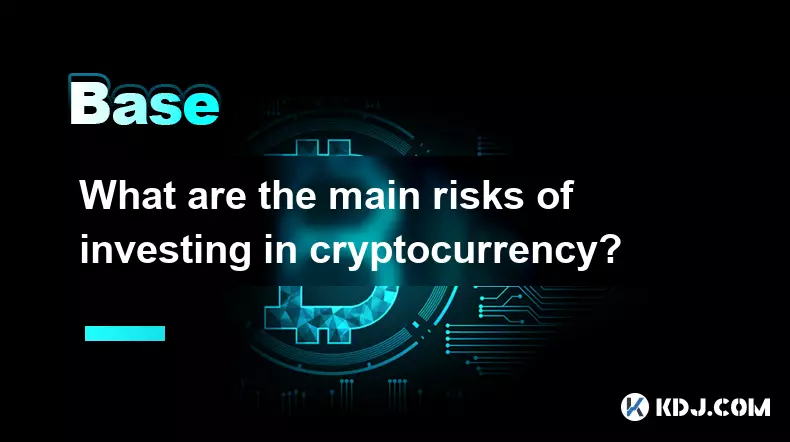-
 bitcoin
bitcoin $109523.663807 USD
-0.13% -
 ethereum
ethereum $4019.526508 USD
2.06% -
 tether
tether $1.000482 USD
0.00% -
 xrp
xrp $2.776815 USD
0.18% -
 bnb
bnb $958.942396 USD
0.12% -
 solana
solana $204.294698 USD
3.84% -
 usd-coin
usd-coin $0.999693 USD
0.00% -
 dogecoin
dogecoin $0.232115 USD
2.09% -
 tron
tron $0.338028 USD
0.84% -
 cardano
cardano $0.790920 USD
1.50% -
 hyperliquid
hyperliquid $44.871443 USD
5.60% -
 ethena-usde
ethena-usde $1.000322 USD
0.04% -
 chainlink
chainlink $21.034165 USD
2.60% -
 avalanche
avalanche $28.794831 USD
-0.54% -
 stellar
stellar $0.360466 USD
1.24%
What are the main risks of investing in cryptocurrency?
Sudden regulatory changes or social media influence can trigger sharp crypto sell-offs, highlighting risks of market manipulation and volatility. (154 characters)
Sep 22, 2025 at 08:18 am

Risks Associated with Market Volatility
1. Cryptocurrency prices can experience extreme fluctuations within short timeframes, often driven by sentiment, speculation, or macroeconomic news. A digital asset may gain 50% in value one day and lose 60% the next without clear fundamental triggers.
2. The lack of intrinsic valuation models makes it difficult to assess whether a cryptocurrency is overvalued or undervalued. Traditional metrics like P/E ratios or cash flow analysis do not apply directly to most blockchain projects.
3. Liquidity varies significantly across exchanges and tokens. Low-liquidity coins can suffer from slippage during large trades, amplifying losses for investors attempting to exit positions quickly.
4. Whale activity—large holders moving significant amounts of a token—can manipulate price action on smaller-cap cryptocurrencies, creating artificial spikes or crashes that trap retail investors.
5. Sudden regulatory announcements or influential social media posts can trigger cascading sell-offs, as seen during China’s mining bans or high-profile celebrity endorsements followed by reversals.
Security and Technological Vulnerabilities
1. Exchanges and wallets are prime targets for hackers. Numerous high-profile breaches have resulted in the loss of millions of dollars’ worth of digital assets, with no guarantee of recovery.
2. Smart contract bugs in decentralized finance (DeFi) protocols can be exploited by malicious actors. Code vulnerabilities have led to exploits where funds are drained from liquidity pools or lending platforms.
3. Private key management remains a critical risk. If a user loses access to their private keys or seed phrases, the associated funds become permanently inaccessible, with no central authority to restore access.
4. Phishing attacks, fake apps, and impersonation scams are rampant in the crypto space. Users often unknowingly provide credentials or sign malicious transactions that drain their holdings.
5. Rug pulls—where developers abandon a project and withdraw all funds—are common in unregulated token launches, particularly on decentralized exchanges with minimal listing requirements.
Regulatory and Legal Uncertainty
1. Governments around the world have taken divergent approaches to cryptocurrency regulation. Some countries ban trading outright, while others impose strict licensing rules on exchanges and service providers.
2. Tax treatment of crypto transactions varies widely and is often unclear. Misreporting gains or failing to declare disposals can lead to penalties, audits, or legal consequences.
3. Regulatory crackdowns on specific sectors—such as privacy coins, stablecoins, or DeFi platforms—can render certain investments unusable or illegal overnight.
4. Securities laws may classify certain tokens as unregistered securities, leading to enforcement actions that freeze development, delist tokens, or shut down entire projects.
5. Lack of investor protection frameworks means that fraud, market manipulation, and insolvency events typically leave victims with no recourse for compensation.
Frequently Asked Questions
What happens if a cryptocurrency exchange gets hacked?In most cases, users bear the financial loss unless the exchange has insurance or chooses to reimburse affected accounts. Many platforms do not fully cover losses, especially for older or less-known exchanges.
Can governments shut down cryptocurrencies?While they cannot eliminate decentralized networks like Bitcoin, governments can restrict access to exchanges, ban transactions, criminalize usage, or block network nodes within their jurisdictions, severely limiting usability.
How can I protect my cryptocurrency investments?Use hardware wallets for long-term storage, enable two-factor authentication, verify smart contracts before interacting, and avoid sharing private keys or seed phrases under any circumstances.
Are stablecoins completely safe from volatility?No. While designed to maintain a fixed value, stablecoins can de-peg due to reserve insolvency, loss of confidence, or systemic issues—as demonstrated by the collapse of TerraUSD in 2022.
Disclaimer:info@kdj.com
The information provided is not trading advice. kdj.com does not assume any responsibility for any investments made based on the information provided in this article. Cryptocurrencies are highly volatile and it is highly recommended that you invest with caution after thorough research!
If you believe that the content used on this website infringes your copyright, please contact us immediately (info@kdj.com) and we will delete it promptly.
- BlockchainFX: The Crypto Presale Primed for a 2025 ROI Explosion
- 2025-09-27 18:25:19
- ETH Price Check: Smart Money Stays Cool Amidst ATH Rollercoaster
- 2025-09-27 18:25:19
- Aster Price, MrBeast, and DEX Volumes: What's the Buzz?
- 2025-09-27 18:45:11
- Shiba Inu, Meme Coins, and MAGACOIN FINANCE: What's Next?
- 2025-09-27 18:45:11
- Aster DEX: Navigating DeFi's Future with Price Predictions and Key Insights
- 2025-09-27 18:50:01
- Virtuals Protocol's New Genesis: A Deep Dive into the Launch and $VIRTUAL's Potential
- 2025-09-27 18:50:01
Related knowledge

What are some common methods of cryptocurrency market manipulation?
Sep 27,2025 at 02:55am
Wash Trading and Its Impact on Market Perception1. Wash trading involves an individual or entity simultaneously buying and selling the same cryptocurr...

How do I read a cryptocurrency whitepaper?
Sep 27,2025 at 05:54am
Understanding the Structure of a Cryptocurrency Whitepaper1. Begin by identifying the executive summary, which outlines the project’s core vision and ...

Can I recover lost cryptocurrency?
Sep 25,2025 at 08:18am
Understanding the Nature of Cryptocurrency Loss1. Cryptocurrency operates on decentralized networks, meaning there is no central authority to reverse ...

How do I choose a cryptocurrency investment strategy?
Sep 27,2025 at 03:55pm
Understanding Risk Tolerance in Crypto Investing1. Assessing personal risk tolerance is a foundational step when entering the cryptocurrency market. V...

How can I earn passive income from cryptocurrency?
Sep 23,2025 at 10:18am
Staking Cryptocurrencies for Regular Returns1. Many blockchain networks operate on a proof-of-stake (PoS) consensus mechanism, allowing users to earn ...

What are gas fees in cryptocurrency transactions?
Sep 26,2025 at 02:00am
Understanding Gas Fees in Blockchain Transactions1. Gas fees are payments made by users to compensate for the computing energy required to process and...

What are some common methods of cryptocurrency market manipulation?
Sep 27,2025 at 02:55am
Wash Trading and Its Impact on Market Perception1. Wash trading involves an individual or entity simultaneously buying and selling the same cryptocurr...

How do I read a cryptocurrency whitepaper?
Sep 27,2025 at 05:54am
Understanding the Structure of a Cryptocurrency Whitepaper1. Begin by identifying the executive summary, which outlines the project’s core vision and ...

Can I recover lost cryptocurrency?
Sep 25,2025 at 08:18am
Understanding the Nature of Cryptocurrency Loss1. Cryptocurrency operates on decentralized networks, meaning there is no central authority to reverse ...

How do I choose a cryptocurrency investment strategy?
Sep 27,2025 at 03:55pm
Understanding Risk Tolerance in Crypto Investing1. Assessing personal risk tolerance is a foundational step when entering the cryptocurrency market. V...

How can I earn passive income from cryptocurrency?
Sep 23,2025 at 10:18am
Staking Cryptocurrencies for Regular Returns1. Many blockchain networks operate on a proof-of-stake (PoS) consensus mechanism, allowing users to earn ...

What are gas fees in cryptocurrency transactions?
Sep 26,2025 at 02:00am
Understanding Gas Fees in Blockchain Transactions1. Gas fees are payments made by users to compensate for the computing energy required to process and...
See all articles









































































